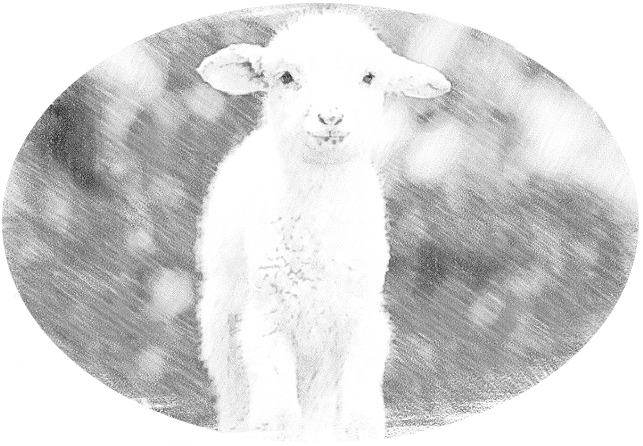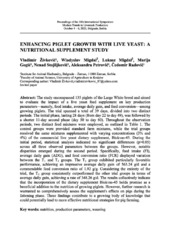Приказ основних података о документу
Enhancing piglet growth with live yeast: a nutritional supplement study
| dc.creator | Živković, Vladimir | |
| dc.creator | Migdal, Wladyslav | |
| dc.creator | Migdal, Lukasz | |
| dc.creator | Gogić, Marija | |
| dc.creator | Stojiljković, Nenad | |
| dc.creator | Petrović, Aleksandra | |
| dc.creator | Radović, Čedomir | |
| dc.date.accessioned | 2023-10-19T07:34:35Z | |
| dc.date.available | 2023-10-19T07:34:35Z | |
| dc.date.issued | 2023 | |
| dc.identifier.isbn | 978-86-82431-80-0 | |
| dc.identifier.uri | http://r.istocar.bg.ac.rs/handle/123456789/914 | |
| dc.description.abstract | The study encompassed 135 piglets of the Large White breed and aimed to evaluate the impact of a live yeast feed supplement on key production parameters—namely, feed intake, average daily gain, and feed conversion—among growing piglets. The trial spanned a total of 39 days, divided into two distinct periods. The initial phase, lasting 28 days (from day 22 to day 49), was followed by a shorter 11-day second phase (day 50 to day 60). Throughout the observation periods, two distinct feed mixtures were employed, as outlined in Table 1. The control groups were provided standard farm mixtures, while the trial groups received the same mixtures supplemented with varying concentrations (3% and 4%) of the commercial live yeast dietary supplement, Biokvas-45. During the initial period, statistical analysis indicated no significant differences (p>0.05) across all three observed parameters between the groups. However, notable disparities emerged during the second period. Specifically, feed intake (FI), average daily gain (ADG), and feed conversion ratio (FCR) displayed variation between the T1 and T2 groups. The T2 group exhibited particularly favorable performance, achieving an impressive average daily gain of 563.24 g/d and a commendable feed conversion ratio of 1.92 g/g. Considering the entirety of the trial, the T2 group consistently outperformed the other trial groups in terms of average daily gain, achieving a rate of 348.26 g/d. The results collectively indicate that the incorporation of the dietary supplement Biokvas-45 holds promise as a beneficial addition to the nutrition of growing piglets. However, further research is warranted to comprehensively assess the supplement's effects on pigs during the fattening phase. These findings contribute to a growing body of knowledge that could potentially lead to more effective nutritional strategies for pig farming. | sr |
| dc.language.iso | en | sr |
| dc.publisher | Institute for animal husbandry, Belgrade | sr |
| dc.relation | info:eu-repo/grantAgreement/MESTD/inst-2020/200022/RS// | sr |
| dc.rights | openAccess | sr |
| dc.rights.uri | https://creativecommons.org/licenses/by/4.0/ | |
| dc.source | Proceedings of the 14th International Symposium Modern Trends in Livestock Production October 4 – 6, 2023, Belgrade, Serbia | sr |
| dc.subject | nutrition | sr |
| dc.subject | production parameters | sr |
| dc.subject | weaning | sr |
| dc.title | Enhancing piglet growth with live yeast: a nutritional supplement study | sr |
| dc.type | conferenceObject | sr |
| dc.rights.license | BY | sr |
| dc.citation.spage | 83 | |
| dc.citation.epage | 92 | |
| dc.identifier.rcub | https://hdl.handle.net/21.15107/rcub_ristocar_914 | |
| dc.identifier.fulltext | http://r.istocar.bg.ac.rs/bitstream/id/4587/VZivkovic.pdf | |
| dc.type.version | publishedVersion | sr |


